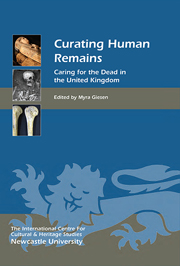Book contents
- Frontmatter
- Contents
- List of Illustrations
- Acknowledgments
- List of abbreviations
- Introduction: Human Remains Curation in the United Kingdom
- 1 International Perspectives towards Human Remains Curation
- 2 Dealings with the Dead: A Personal Consideration of the Ongoing Human Remains Debate
- 3 Care, Custody and Display of Human Remains: Legal and Ethical Obligations
- 4 The Impact and Effectiveness of the Human Tissue Act 2004 and the Guidance for the Care of Human Remains in Museums in England
- 5 Dead and Forgotten? Some Observations on Human Remains Documentation in the UK
- 6 Tethering Time and Tide? Human Remains Guidance and Legislation for Scottish Museums
- 7 The Quick and the Deid: A Scottish Perspective on Caring for Human Remains at the Perth Museum and Art Gallery
- 8 The Museum of London: An Overview of Policies and Practice
- 9 Curating Human Remains in a Regional Museum: Policy and Practice at the Great North Museum: Hancock
- 10 Curation of Human Remains at St Peter's Church, Barton-upon-Humber, England
- 11 Archaeological Human Remains and Laboratories: Attaining Acceptable Standards for Curating Skeletal Remains for Teaching and Research
- 12 ‘No Room at the Inn’ … Contract Archaeology and the Storage of Human Remains
- 13 Changes in Policy for Excavating Human Remains in England and Wales
- 14 Conclusions and Ways Forward
- Appendix 1 DCMS Guidance for the Care of Human Remains in Museums: Contents page and Part 2
- Appendix 2 MGS Guidelines for the Care of Human Remains in Scottish Museum Collections: Contents page and Chapter 2
- List of Contributors
- Index
- Miscellaneous Endmatter
13 - Changes in Policy for Excavating Human Remains in England and Wales
Published online by Cambridge University Press: 05 May 2013
- Frontmatter
- Contents
- List of Illustrations
- Acknowledgments
- List of abbreviations
- Introduction: Human Remains Curation in the United Kingdom
- 1 International Perspectives towards Human Remains Curation
- 2 Dealings with the Dead: A Personal Consideration of the Ongoing Human Remains Debate
- 3 Care, Custody and Display of Human Remains: Legal and Ethical Obligations
- 4 The Impact and Effectiveness of the Human Tissue Act 2004 and the Guidance for the Care of Human Remains in Museums in England
- 5 Dead and Forgotten? Some Observations on Human Remains Documentation in the UK
- 6 Tethering Time and Tide? Human Remains Guidance and Legislation for Scottish Museums
- 7 The Quick and the Deid: A Scottish Perspective on Caring for Human Remains at the Perth Museum and Art Gallery
- 8 The Museum of London: An Overview of Policies and Practice
- 9 Curating Human Remains in a Regional Museum: Policy and Practice at the Great North Museum: Hancock
- 10 Curation of Human Remains at St Peter's Church, Barton-upon-Humber, England
- 11 Archaeological Human Remains and Laboratories: Attaining Acceptable Standards for Curating Skeletal Remains for Teaching and Research
- 12 ‘No Room at the Inn’ … Contract Archaeology and the Storage of Human Remains
- 13 Changes in Policy for Excavating Human Remains in England and Wales
- 14 Conclusions and Ways Forward
- Appendix 1 DCMS Guidance for the Care of Human Remains in Museums: Contents page and Part 2
- Appendix 2 MGS Guidelines for the Care of Human Remains in Scottish Museum Collections: Contents page and Chapter 2
- List of Contributors
- Index
- Miscellaneous Endmatter
Summary
Introduction
This chapter examines the legal and procedural aspects concerning the archaeological excavation of human remains in England and Wales (the situation in Scotland is covered by different legislation; see Chapter 6). There is a wide variety of legislation and codes of practice, which bear directly or indirectly upon the archaeological recovery of such remains and their subsequent analysis and curation. Since 2008, the situation has proved problematic because of a reinterpretation of the burial laws that affect archaeology (see Sayer 2010). Changes in advice and consultation by the Ministry of Justice (MoJ) have attempted to resolve these problems, but requests to draw up new legislation have been declined.
Archaeology in the UK has often had a ‘softly softly’ relationship with legislators. In the 1980s and 1990s, the profession was emerging and finding its place within society. As part of this process, funding for ‘rescue’ or ‘salvage’ archaeology moved from local and central government to developers. Things are different now. Commercial archaeologists have successfully operated within the construction industry for two decades, contributing significantly to the number of recorded sites. While the public may not get their hands dirty on rescue excavations as they did in the 1970s and 1980s, far more of them consume their heritage as recreation through magazines and websites, popular TV programming, museum visits, organised public archaeology events and excavation open days. Some estimates suggest that the heritage industry, including its tourism element, is worth up to £1bn to the British economy.
- Type
- Chapter
- Information
- Curating Human RemainsCaring for the Dead in the United Kingdom, pp. 147 - 158Publisher: Boydell & BrewerPrint publication year: 2013



